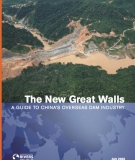China is building hydropower projects around the world. We are currently aware of at least 140 large dams with Chinese involvement in 40 countries, and counting. Many of these projects pose serious social and environmental risks. NGOs need to learn how to deal with the new actors in the dam building world. A guide by International Rivers shows how to do this.
Date: Tuesday, September 16, 2008 - 16:04
Nice to see that our work on China's overseas dam builders is making waves in Fiji. A civil society group with a strong reputation as an independent government watchdog has questioned the credibility of Sinohydro, the main contractor in a large dam project on the Pacific island, because of its safety and environmental record. Here is a news report from the Fiji Times.
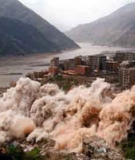
Date: Monday, September 15, 2008 - 17:41
Three Gorges DemolitionA new report from the Chinese Academy of Sciences finds that the cost of environmental destruction in China was $402 billion in 2005, or close to one seventh of the country’s economic output. There is a growing realization in China that the current growth model is not sustainable, and should not be exported to other countries unabated.
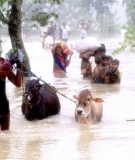
Date: Wednesday, September 10, 2008 - 17:53
Kosi River Breaks EmbankmentTransparency International’s Global Corruption Report 2008, to which your blogger contributed a brief paper, is devoted to corruption in the water sector. It states forcefully that “corruption in the water sector puts the lives and livelihoods of billions of people at risk”. The recent flood disaster on the Kosi River in Nepal and India illustrates in a shocking way how corruption, dams and disaster feed on each other.

Date: Friday, September 5, 2008 - 11:06
Protest in BerlinThe high drama over Turkey’s Ilisu Dam continues. A new report by the official monitoring team demonstrates that the project continues to violate the conditions under which Austria, Germany and Switzerland agreed to fund the project. Ilisu has become a test case for the dam industry’s efforts to strengthen the social and environmental acceptability of its projects.
Date: Wednesday, June 11, 2008 - 08:37
In ancient Israel,
among other places, farmers conserved the fertility of their soils by letting
their fields lay fallow every seventh year. Even the Bible mandates that "you
may plant your land for six years and gather its crops. But during the seventh
year, you must leave it alone and withdraw from it." Thus the concept of the Sabbath
year was born.
Date: Thursday, May 29, 2008 - 07:53
In Beijing on a mission for our China global program, more doors are opening for us than in the past. The emerging picture is still confusing. Understanding the contradictions of China’s overseas investment policies can be as difficult as navigating a Beijing traffic jam.
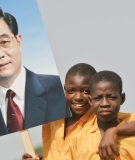
Date: Wednesday, May 14, 2008 - 12:27
A new report written by your blogger discusses China’s environmental footprint in Africa. Are Chinese investors Africa's new colonizers? Are they simply following the mold of Western investment? Or does China's investment offer new opportunities of South-South cooperation? This is a hot topic, and my report has already triggered controversial reactions.
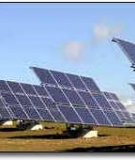
Date: Thursday, April 10, 2008 - 00:00
A new report shows that investment in wind and solar energy surpassed support for large hydro projects in 2007. The World Bank has missed the trend on emerging renewable technologies, and continues to focus its support on large dams.
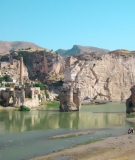
Date: Monday, April 7, 2008 - 14:23
The ancient town of Hasankeyf will be flooded by the Ilisu DampeevishsoulGovernments and financial institutions have come under increasing pressure not to fund environmentally and socially destructive projects. In the case of the Chad-Cameroon Oil Pipeline, the Nam Theun 2 Dam in Laos and the Ilisu Dam in Turkey, the World Bank and Western governments have resorted to approving financial support under strict conditions. This approach has so far not worked because funders were not serious about enforcing their conditions. The Ilisu Dam is now facing a crunch. It may salvage the remaining credibility of Western donors – or drown it out completely. (Updated)
Date: Thursday, March 20, 2008 - 00:00
Nigeria is being rocked by a huge corruption scandal. As President Yar’Adua recently revealed, the administration of his predecessor spent $16 billion on the power sector, but appears to have diverted much of the money. The ongoing investigation has unearthed interesting details about how corruption works in practice. The story involves dam builders from Germany, China and other countries and senior World Bank officials.
Date: Tuesday, March 11, 2008 - 00:00
African governments have often praised Chinese investment as the panacea for their infrastructure sectors. Zambia’s experience demonstrates that it is not. A Chinese hydropower project on the Kafue River has brought up the whole conundrum of financial problems, environmental impacts, hydro dependency and delays that is typical for large dams.
Date: Wednesday, March 5, 2008 - 00:00
With a capacity of 1,070 megawatts and a price tag of $1.45 billion, the Nam Theun 2 Dam in Laos is the biggest hydropower project that the World Bank has approved in more than ten years. A large reservoir and the diversion of the Theun River into another major river will affect more than 100,000 people, and the project’s benefits are unlikely to reach the country’s rural poor.
Date: Friday, February 22, 2008 - 14:51
Here are some brief reviews of new publications which have crossed my desk in recent weeks: China in Africa – China’s New Dictatorship Diplomacy – Mother Jones Story on China and the Environment – China’s Involvement in Cambodia’s Hydropower Sector
Date: Thursday, February 21, 2008 - 00:00
We have received a lot of positive feedback to the launch of my new blog on international financial institutions and the environment. Encouraging comments have reached us from NGOs in China, Africa and other parts of the world, academics, journalists, government and World Bank officials.
Date: Tuesday, February 12, 2008 - 16:04
In Mauritania and Liberia, the Chinese government for the first time joined the World Bank-sponsored donor meetings which coordinate aid to developing countries. China’s participation reflects a gradually increasing cooperation between Beijing and the Washington-based financial institution. From a civil society perspective, this is a mixed bag.
Date: Monday, February 11, 2008 - 12:10
Even at the pump, we now rely on Chinese companies to do the dirty work for us.
Date: Wednesday, January 30, 2008 - 16:13
We can report good news from China, and need to watch out for a potential downside.


